 Beirut, Lebanon – As good as his word, Alemayehu Shumye of Ethiopia won the BLOM Beirut Marathon on Sunday morning (30), obliterating the course record by over four minutes in the process, with 2:12:47. Shumye won by over three minutes, with Michael Kipkorir of Kenya second in 2:16:15, and another Ethiopian, Hussen Adem third in 2:16:44. All three were inside the previous record of 2:17:04, set by Paul Rugut of Kenya, in the inaugural race in 2003. There was an Ethiopian 1-2-3 in the women
Beirut, Lebanon – As good as his word, Alemayehu Shumye of Ethiopia won the BLOM Beirut Marathon on Sunday morning (30), obliterating the course record by over four minutes in the process, with 2:12:47. Shumye won by over three minutes, with Michael Kipkorir of Kenya second in 2:16:15, and another Ethiopian, Hussen Adem third in 2:16:44. All three were inside the previous record of 2:17:04, set by Paul Rugut of Kenya, in the inaugural race in 2003. There was an Ethiopian 1-2-3 in the women
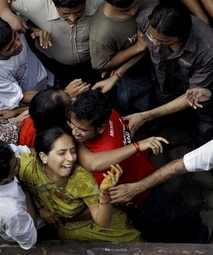 MUMBAI, India
MUMBAI, India
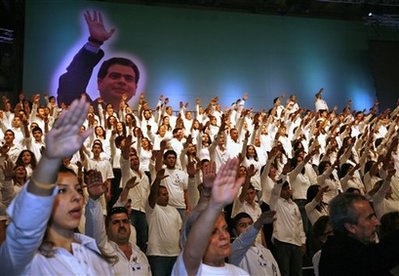
By Hussein Abdallah, BEIRUT: Former President Amin Gemayel called on Sunday for the disarming of Hizbullah and Palestinian factions inside and outside refugee camps. The Phalange Party leader issued the call during a speech at a memorial service to mark two years since the assassination of his son, MP and Industry Minister Gemayel. "The state cannot allow any illegal military presence on any of its territories … not the weapons of Palestinian factions … not the weapons of Hizbullah," he told the party faithful and senior members of the March 14 Forces of which the Phalange is a part. " The time has come for all these arms to be handed over to the state." He added that "illegitimate" arms in Lebanon have exposed the country to the threat of Israeli attack and reflected negatively on the economic situation.
"We can build our economy through Paris I, II, and III and not through Zelzal 1, 2, and 3," he said, referring respectively to international donor conferences to support Lebanon and some of the missiles believed to be in Hizbullah’s arsenal. The memorial service was held in Karantina, a northern suburb of Beirut, and included the swearing in of 4,200 new Phalange members. Gemayel also said that talks on a national defense strategy should focus on finding ways to maintain peace in Lebanon. "We need a strategy for peace and not war," he said. "Lebanon’s peace is its only defense." However, Parliament Speaker Nabih Berri called Sunday for preserving Lebanon by preserving the resistance. "Resistance should remain in the heart of the South, which will always be in the heart of Lebanon," he said. Speaking during a ceremony for his Amal Movement’s Al-Resala Scouts, the speaker addressed the security situation inside Palestinian refugee camps.
"The camps, which were always a target for Israel, are becoming a target for terrorism," he said, urging Palestinian factions to develop a unified stance against extremism. Berri’s remarks came as Palestinian groups at Sidon’s Ain al-Hilweh camp were considering ways to arrange the handover of a fugitive to the Lebanese Army. Separately, President Michel Sleiman begins a two-day visit to Iran on Monday at the invitation of Iranian counterpart, Mahmoud Ahmadinejad. "The president will discuss everything: political and economic issues, bilateral relations, the situation in the Middle East, the peace process," a government official told AFP Sunday on condition of anonymity. Talks will also cover Lebanon’s efforts to forge a national defense strategy – where Hizbullah’s arsenal remains a thorny issue – the official said. Iran is a staunch supporter of the Hizbullah, which is also backed by Syria, but Tehran has denies Western and Israeli charges that it provides military assistance to Hizbullah. Last May, the Shiite group and some of its allies staged a brief takeover of mainly Sunni parts of west Beirut, amid deadly clashes which brought the country to the brink of civil war and left at least 68 people dead.
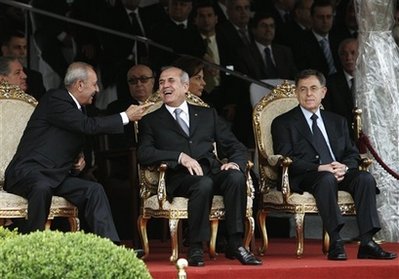 BEIRUT (AFP)
BEIRUT (AFP)
Rome, 17 Nov. (AKI) – Pope Benedict on Monday urged national unity in conflict-scarred Lebanon. During an audience with Lebanon’s new ambassador to the Holy See, Georges Chakib El-Khoury, Benedict said he hoped the Lebanese people "may courageously continue their efforts to build a united and solidary society.""The millennial history of the country, and the […]
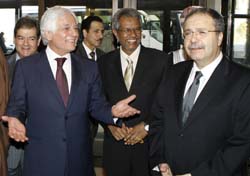 By Nicholas Kimbrell, BEIRUT: Although Syrian-Lebanese relations appear to be improving, they have been complicated by the sparring between the Syrian government and members of Lebanon’s ruling March 14 alliance over allegations about the funding of a militant Islamist group, analysts told The Daily Star Monday. Prior to President Michel Sleiman’s landmark visit to Syria in mid-August, the two countries had agreed to establish diplomatic relations. In October, Foreign Minister Fawzi Salloukh met with his Syrian counterpart Walid Moallem in Damascus to cement the formalization of ties. Interior Minster Ziyad Baroud traveled to Damascus last week, returning with a bilateral security agreement, and Information Minster Tarek Mitri was received in Damascus Sunday for a joint meeting of the Arab Information Committee. Speaking from Damascus, Mitri called the Syrian-Lebanese relationship "strong," adding that the relationship was based on "mutual respect and common interests."
By Nicholas Kimbrell, BEIRUT: Although Syrian-Lebanese relations appear to be improving, they have been complicated by the sparring between the Syrian government and members of Lebanon’s ruling March 14 alliance over allegations about the funding of a militant Islamist group, analysts told The Daily Star Monday. Prior to President Michel Sleiman’s landmark visit to Syria in mid-August, the two countries had agreed to establish diplomatic relations. In October, Foreign Minister Fawzi Salloukh met with his Syrian counterpart Walid Moallem in Damascus to cement the formalization of ties. Interior Minster Ziyad Baroud traveled to Damascus last week, returning with a bilateral security agreement, and Information Minster Tarek Mitri was received in Damascus Sunday for a joint meeting of the Arab Information Committee. Speaking from Damascus, Mitri called the Syrian-Lebanese relationship "strong," adding that the relationship was based on "mutual respect and common interests."
He noted that Sleiman’s visit had paved the way for recent improvements in ties after "passing through a difficult phase." However, residual tensions and recent accusations have led some to question the extent to which the Syrian-Lebanese relationship has improved. Comments by Syrian President Bashar Assad in September warning of the growing extremist threat in Tripoli, followed by the deployment of 10,000 Syrian troops to the Lebanese border, stoked fears in Lebanon of a potential incursion in the North. More recently, Syrian State Television aired a collection of "confessions" from members of the militant Islamist group, Fatah al-Islam, in which certain members claimed to have received funding from March 14 leader Saad Hariri and his Future Movement.
The Mustaqbal daily, a Hariri-owned paper, fired back Saturday with separate testimonies blaming Syria for sponsoring the group, which waged a fierce war against the Lebanese army in and around the Nahr al-Bared refugee camp during the summer of 2007. The battle left hundreds dead, including 168 soldiers, dozens of civilians and over 200 militants.
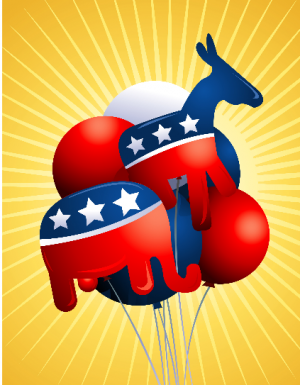 Malek el Khazen, November 2008 – Let us ask ourselves this first question: How did the Republicans fail? or did the Republicans really fail? Let me rephrase this question to what was different that made the Democrats win? The answer seems easy and yes it is logical, and the same process was applied in France, in Zimbabwe and many other countries during election within these last 2 years. What has made the difference in all of these elections are what we will call in this article the silent citizens but not so silent anymore. They are the new registered voters. There is also another variable that all of these candidates were successful enough in convincing their citizens on the ASSUMPTION of CHANGE, HOPE, TRUST and EXPERIENCE.
Malek el Khazen, November 2008 – Let us ask ourselves this first question: How did the Republicans fail? or did the Republicans really fail? Let me rephrase this question to what was different that made the Democrats win? The answer seems easy and yes it is logical, and the same process was applied in France, in Zimbabwe and many other countries during election within these last 2 years. What has made the difference in all of these elections are what we will call in this article the silent citizens but not so silent anymore. They are the new registered voters. There is also another variable that all of these candidates were successful enough in convincing their citizens on the ASSUMPTION of CHANGE, HOPE, TRUST and EXPERIENCE.
Why do I use Assumption? It is important to note that both Democrats and Republicans are well incorporated within the American political system. So whoever is the candidate representing this party is automatically part of the current system and he will have to follow the same procedure to decide and implement laws and lobbying that all of his predecessors has followed. So if these candidates are already part of the system we can ask ourselves how it will be change? from what?? In fact the Executive power in the US is not the only one that is in power, but you still have the Legislative and Judicial powers. And within the Executive power the same structure is set. Which is in other words the Capitalism system and inner circle, ie. Elitism representing 1% of the US population that controls Washington. So they may be change but it would be minimal and we should not expect any kind of change that was mentioned during the campaign.
We have mentioned Elitism representing 1% of the US citizen are the class that drive policies and prioritize issues. In fact, these elite groups control most of the money and the biggest corporations in the US. In result, it is very difficult to fight them. Most importantly these groups are the one that funds presidential campaign. President elect Obama was successful in creating an Assumption that his campaign was funded by people, regular citizens like me and you. But this is not the complete truth. Out of his 426.9 million 50% and more was funded by the same Elite groups and corporation that has funded previous campaign whether Democrats or Republicans. So it is very hard for me to believe that he will start fighting them. It is important to note he had a lot of individual contributions too but the perception that he has created where it seems he had only personal contribution from regular citizen is incorrect. This perception had a lot of positive for his campaign since it has increased in the mind of the US voters that he is an outsider of the system which is not true.But has benefited him and gained support from the new voters.
توقع عضو تكتل التغيير والاصلاح النائب فريد الخازن ان يحصل بعض التغيير، أقله في الاسلوب ومقاربة الملفات في السياسة الاميركية في حال فوز باراك اوباما في الانتخابات الرئاسية الاميركية، معتبرا ان الامور ستظهر بعد استكمال الادارة بأشخاصها وملفاتها.
كلام الخازن جاء في حديث صحفي عن الانتخابات الاميركية وموقعها في الميزان اللبناني فقال: بالنسبة الى المرشح ماكين وعلى رغم تشديده على ان السياسة الخارجية او السياسة بشكل عام ستكون مختلفة عن سياسة بوش، الا ان رئيس الجمهورية الجديد سيكون أسيرا ولو بشكل او بآخر للسياسات السابقة ولا سيما السياسات التي ادت الى فشل في عدد من الملفات سواء في منطقة الشرق الاوسط او في افغانستان وتحديدا موضوع محاربة الارهاب. اما المرشح الآخر ويبدو انه سيفوز اي اوباما فعلا هناك امكانية في التغيير اقله في الاسلوب ومقاربة الملفات وهناك صدقية اكبر لأنه مرشح جديد ورئيس جديد يأتي من حزب آخر.
وفي موضوع الازمة المالية الكبيرة اعتبر ان هناك ثقة اكبر بإمكانية التصدي للمشكلة اذا اتى اوباما وهذا رأي صدر في الولايات المتحدة واوروبا وعدد كبير من الدول. اما الموضوع اللبناني فهو جزء من موضوع اوسع وهو السياسة الخارجية الاميركية في منطقة الشرق الاوسط وطبعا نتأثر بهذا الامر ولكن برأيي هناك مبالغة في الكلام بأن الامور ستنقلب رأسا على عقب او سيكون هناك تغييرات جذرية في المنطقة سواء اتى هذا المرشح او ذاك. واعتبر ان مقاربة اوباما والاسلوب والمستشارين كلها مسائل سيكون فيها تغيير لكن في بعض الملفات الاساسية مثل النزاع العربي الاسرائيلي او الفلسطيني – الاسرائيلي تحديدا الوضع سيئ الى درجة انه قد يستحيل إحداث التغيير الايجابي للوصول الى حل وهو دولة فلسطينية قابلة للحياة لأن الموضوع هنا مرتبط بالموقف الاسرائيلي خصوصا اذا ما اتى الى السلطة بنيامين نتانياهو.
وخلص الى القول انه ما من شك بأن هناك بعض التغيير لكن لا ارى امكانية حدوث تغيير جذري.
وعما يُطرح عن ان اوباما سيكون رئيس الانفتاح على ايران وسوريا في مكان ما اشار الى ان هناك مقاربة مختلفة لكن الى اي مدى ستؤتي بثمار، هذا موضوع ليس واضحا وهنا اريد ان اقول بأن شخصية وشخص وزير الخارجية والمستشارين الاساسيين في السياسة الخارجية لأوباما هذه مسألة مهمة، وهذا الامر غير واضح حتى الآن، لكن من دون شك ستكون هناك مقاربة مختلفة للمواضيع المأزومة في العلاقات الاميركية – الايرانية والاميركية – السورية، وفي ما يخص لبنان هناك مسائل حسمت في الموضوع اللبناني ومن دون شك لن تعود عقارب الساعة الى الوراء في المواضيع الاساسية المرتبطة بالمواضيع السيادية وغيرها.
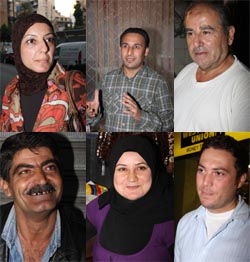 Written by Ray Hanania, Various sources estimate that there are between 3.5 and 4.5 million Arabs in America, with Christians a slight majority over Muslims. There are 7.5 million Muslims in America, but only about 22 percent are Arab and the largest segment are African American and Asian. There is little diversity in terms of their national Arab origins. The vast majority of Arab American officeholders are of Lebanese heritage. There are many reasons for this. The Lebanese were among the first to settle in the U.S. in large numbers. They are almost all Christian, allowing them to assimilate more easily into American society. Although there is a theoretical separation of church and state in America, oftentimes the fastest way to elective office is through church-supported political organizations. But other Arab nationalities are slowly winning office as more and more seek office. The common denominator seems to be that those succeeding in elections are trading-off ties to their home countries of origin with more local activism and community involvement. Some of the better known officeholders include U.S. Senator John Sununu (Palestinian origins and Lebanese heritage), and Congressmen Darrell Issa (California) and Ray LaHood (Illinois), all Republican. Arab Americans are represented in both parties, but the majorities tend to swing back and forth depending on the candidate and the issues in the Middle East. In 2000, for example, Arab Americans overwhelmingly voted Republican to support George W. Bush. In the election contest between Republican John McCain and Democrat Barack Obama, there seems to be a split with a majority of Christian Arabs supporting McCain and a majority of Muslims supporting Obama. Arab American voters share the same concerns as other Americans, from education to jobs to improving the economy. But they also have a special interest in American foreign policy towards the Middle East, and on that criteria, they share an overwhelming disappointment. They often base their choices in national elections, such as for president, on which candidate is "the lesser of two evils." Yet, when Americans across the country flock to the polls on Tuesday, Nov. 4, Arab Americans will be standing with them side-by-side in line to vote. There are more than 13 other Arab Americans who held office including four former U.S. Senators (all Lebanese), and nine congressmen including two women, Mary Rose Oakar, now national president of the American Arab Anti-Discrimination Committee (ADC), in Ohio’s 20th district, and Pat Danner of the 6th District in Missouri.
Written by Ray Hanania, Various sources estimate that there are between 3.5 and 4.5 million Arabs in America, with Christians a slight majority over Muslims. There are 7.5 million Muslims in America, but only about 22 percent are Arab and the largest segment are African American and Asian. There is little diversity in terms of their national Arab origins. The vast majority of Arab American officeholders are of Lebanese heritage. There are many reasons for this. The Lebanese were among the first to settle in the U.S. in large numbers. They are almost all Christian, allowing them to assimilate more easily into American society. Although there is a theoretical separation of church and state in America, oftentimes the fastest way to elective office is through church-supported political organizations. But other Arab nationalities are slowly winning office as more and more seek office. The common denominator seems to be that those succeeding in elections are trading-off ties to their home countries of origin with more local activism and community involvement. Some of the better known officeholders include U.S. Senator John Sununu (Palestinian origins and Lebanese heritage), and Congressmen Darrell Issa (California) and Ray LaHood (Illinois), all Republican. Arab Americans are represented in both parties, but the majorities tend to swing back and forth depending on the candidate and the issues in the Middle East. In 2000, for example, Arab Americans overwhelmingly voted Republican to support George W. Bush. In the election contest between Republican John McCain and Democrat Barack Obama, there seems to be a split with a majority of Christian Arabs supporting McCain and a majority of Muslims supporting Obama. Arab American voters share the same concerns as other Americans, from education to jobs to improving the economy. But they also have a special interest in American foreign policy towards the Middle East, and on that criteria, they share an overwhelming disappointment. They often base their choices in national elections, such as for president, on which candidate is "the lesser of two evils." Yet, when Americans across the country flock to the polls on Tuesday, Nov. 4, Arab Americans will be standing with them side-by-side in line to vote. There are more than 13 other Arab Americans who held office including four former U.S. Senators (all Lebanese), and nine congressmen including two women, Mary Rose Oakar, now national president of the American Arab Anti-Discrimination Committee (ADC), in Ohio’s 20th district, and Pat Danner of the 6th District in Missouri.
DAILY STAR – By Ghenwa Yehia, BEIRUT: Lebanese citizens are responding positively to the outcome of the US election, although some remain skeptical about Barack Obama’s promises to change American policy, The Daily Star learned after speaking to locals from Beirut. The shared opinion of many Lebanese is that Obama’s passion and personality offer hope for the future. Sanaa Itani, 40, followed the election closely as it played out over the past months. She instantly took a liking to Obama because he seemed genuine in his desire for change. "Every time I saw him on television I became more and more convinced of his genuine passion," she says. "Whether it is where he stands on certain issues or his policies I just intuitively feel like he means what he said. I think America made a good choice."
Like Itani, Hadi Haddad, a 51-year-old sewing supply store owner, says that Obama has an authentic spirit and truly believed in what he was campaigning for. The end result obviously reflects that he connected with the American people, Haddad says. "I heard a story of an 80-year-old American woman who waited hours in line to vote for Obama just because she really believed in what he was saying," Haddad explains. "You can’t fake that kind of passion. Obama would only be able to evoke that kind of passion in people if he himself believed in what he was saying." Other people think that despite all of Obama’s promises during the campaign, it is still much too early to tell whether he will make good on his promise for change. "We haven’t seen anything of him yet," says Jamal Hussein, 50. "For example, he said in his campaign, in regards to foreign relations, that he will be the friend of any country that is a friend to America. Now this is what he says, but we haven’t seen him in action yet to see if he spoke the truth." Kamil Harb, a 70-year-old owner of a laundromat, agrees with Hussein. "Right now all of these are just words," he says of campaign promises. He even goes a step farther to categorize Obama among the ranks of all other politicians: liars.
إعــادةُ هَـنْـدَسة الـ 10452 كـلم



